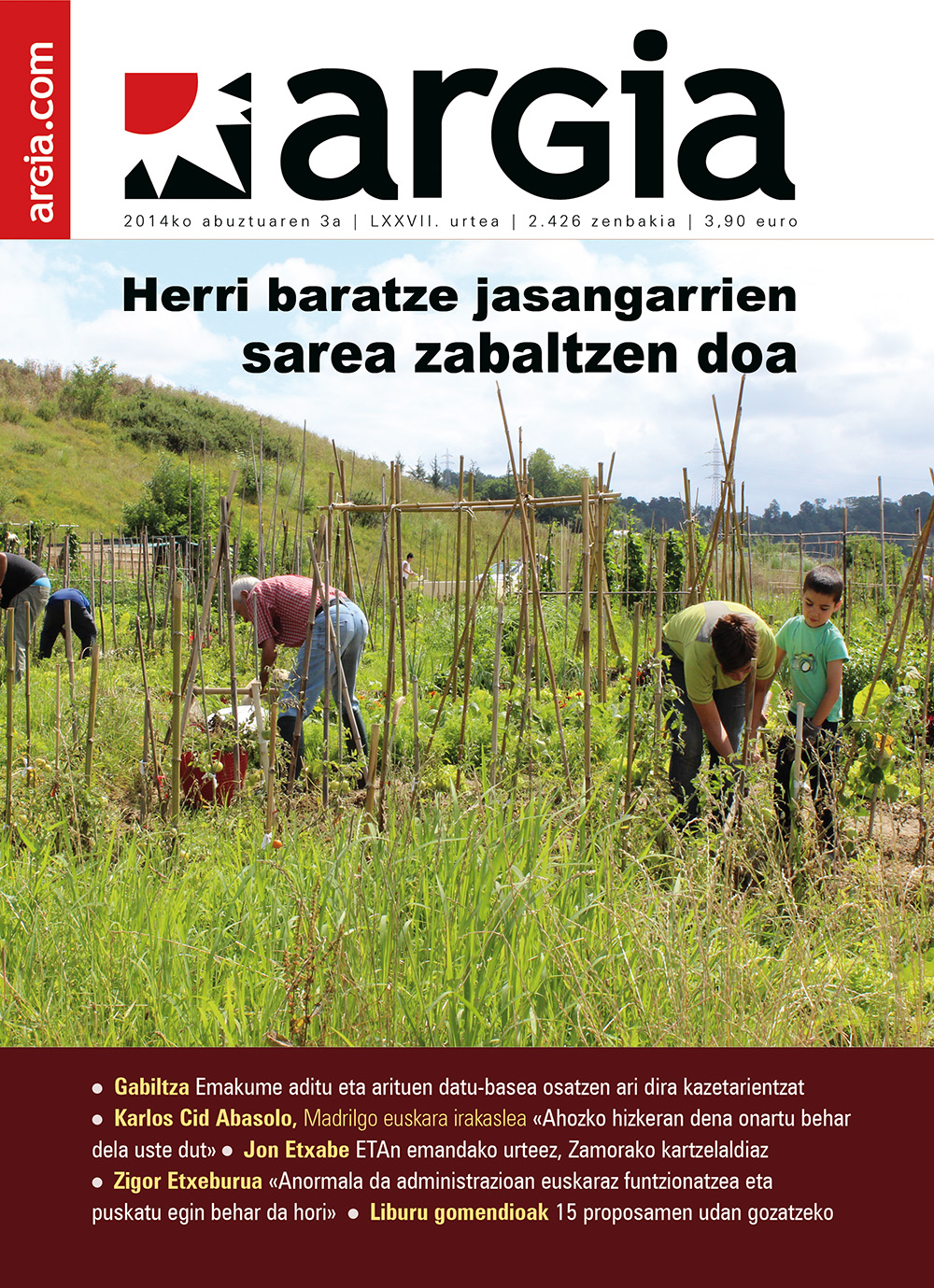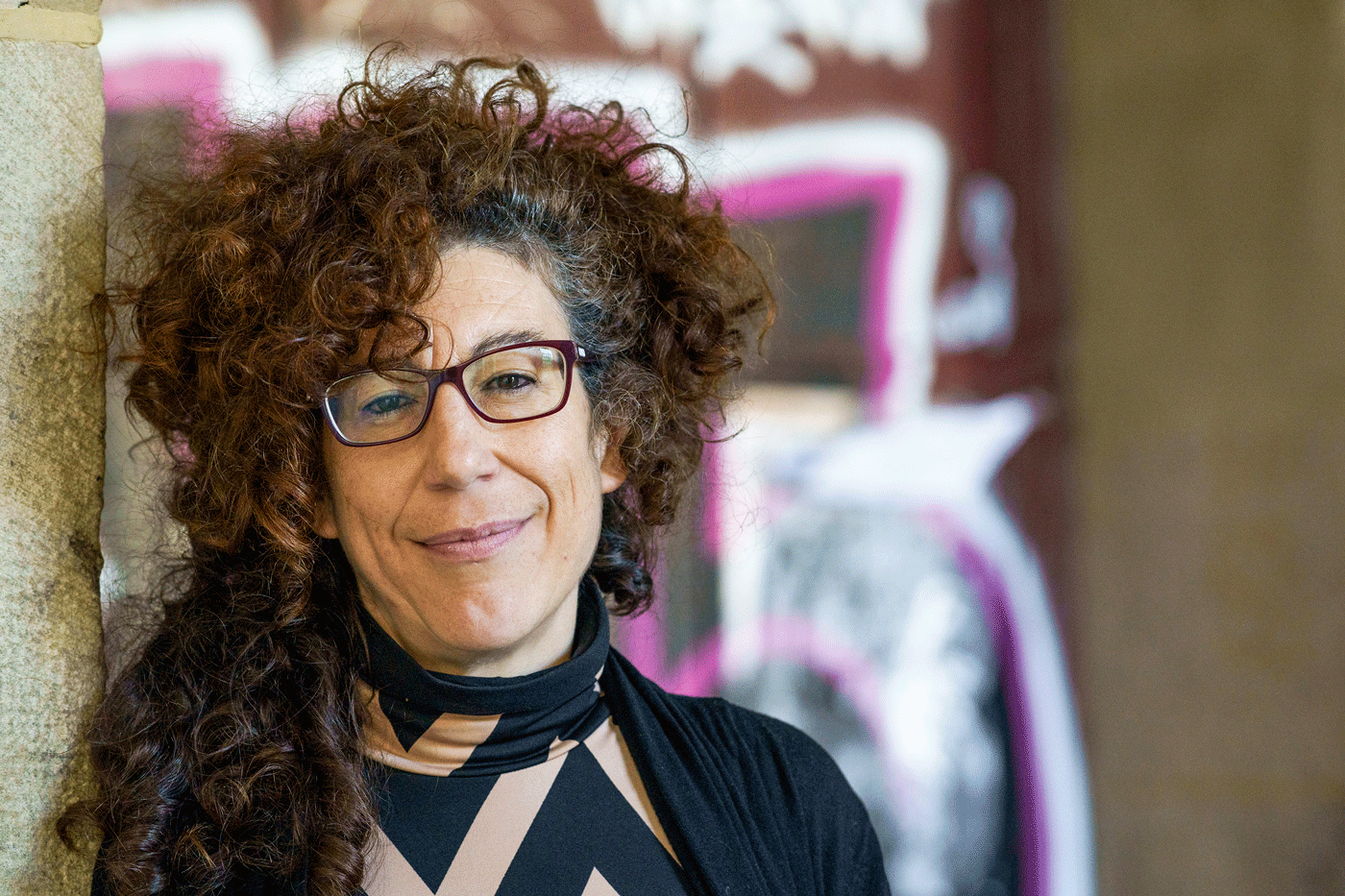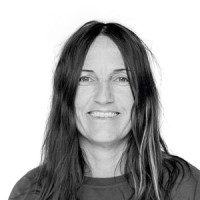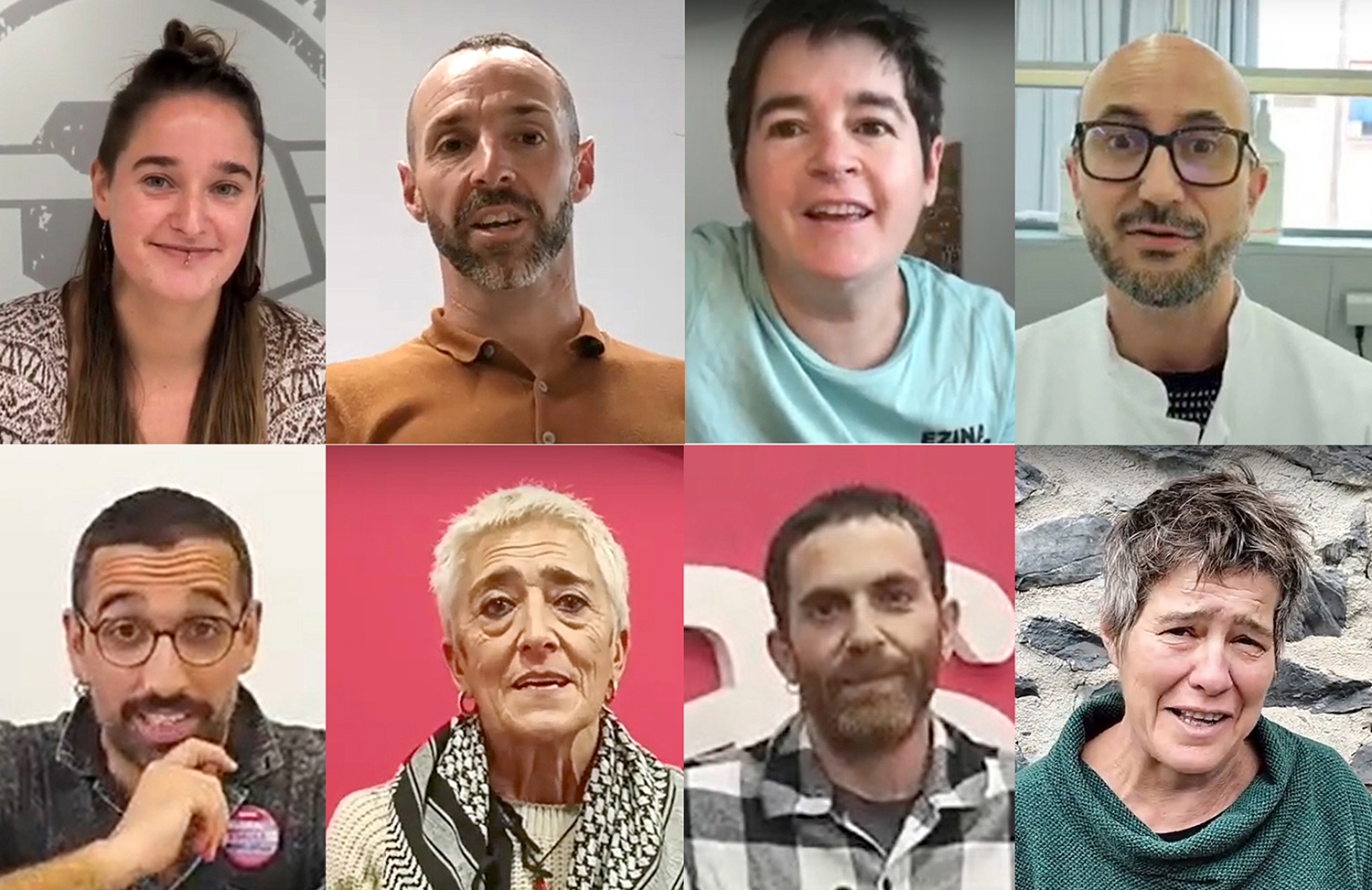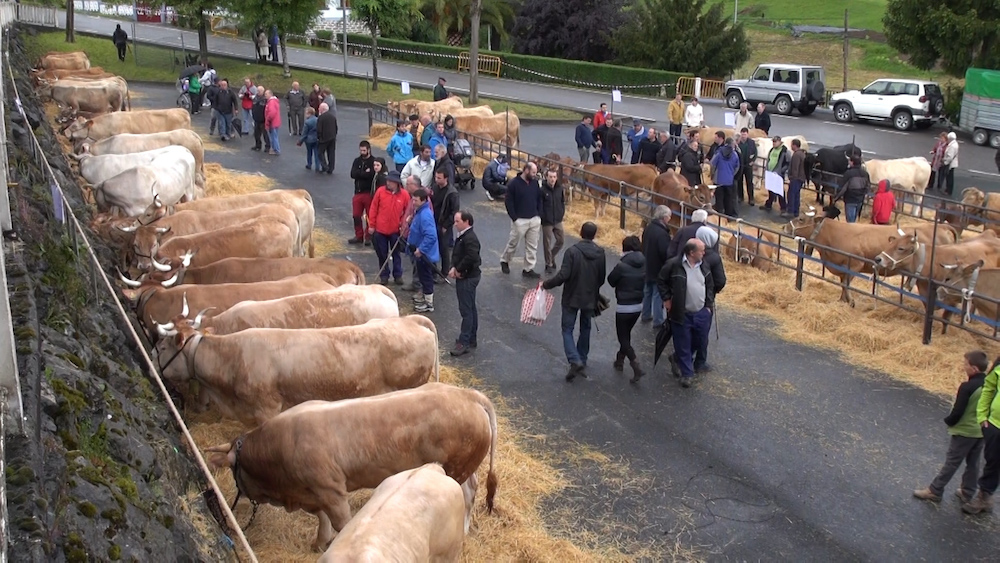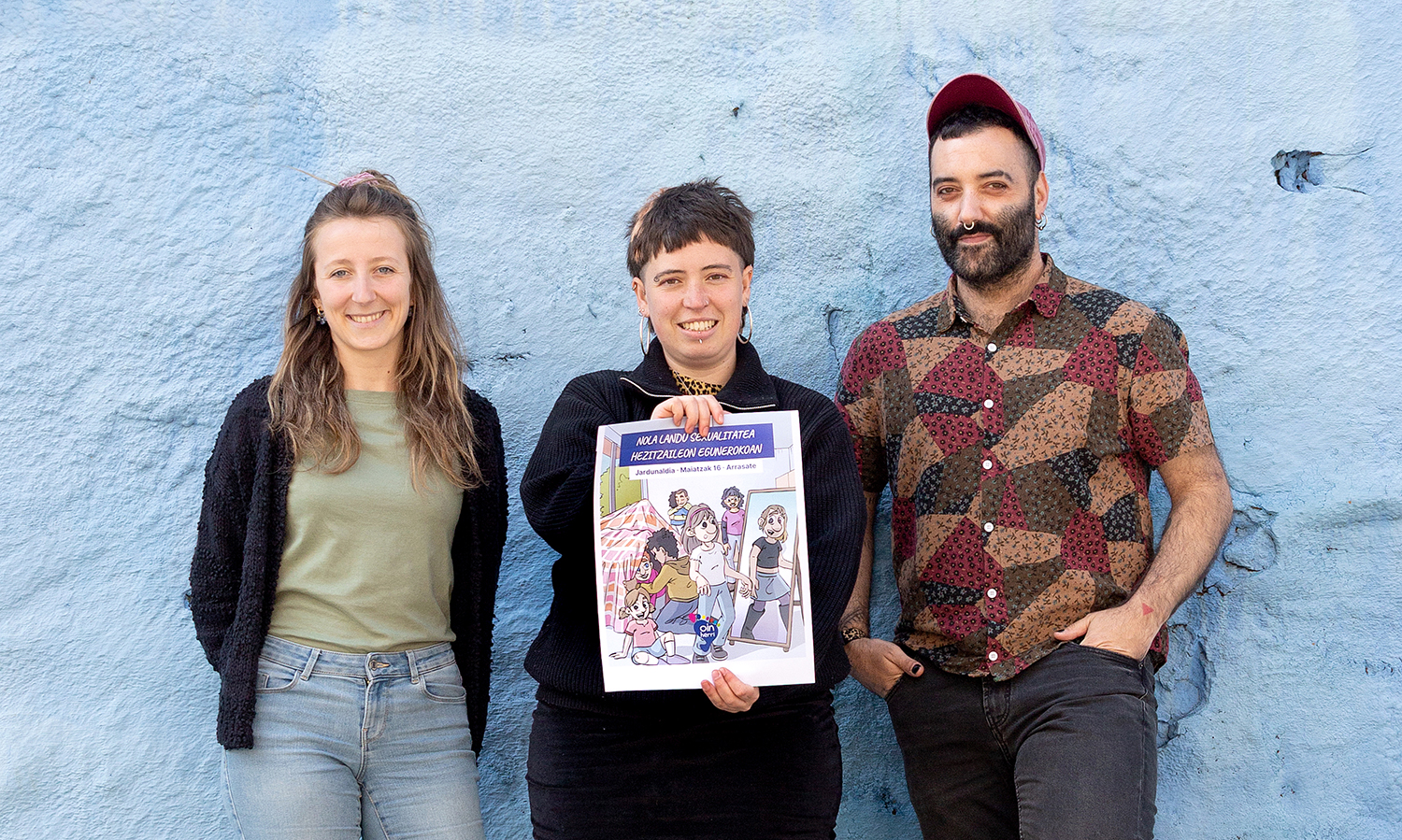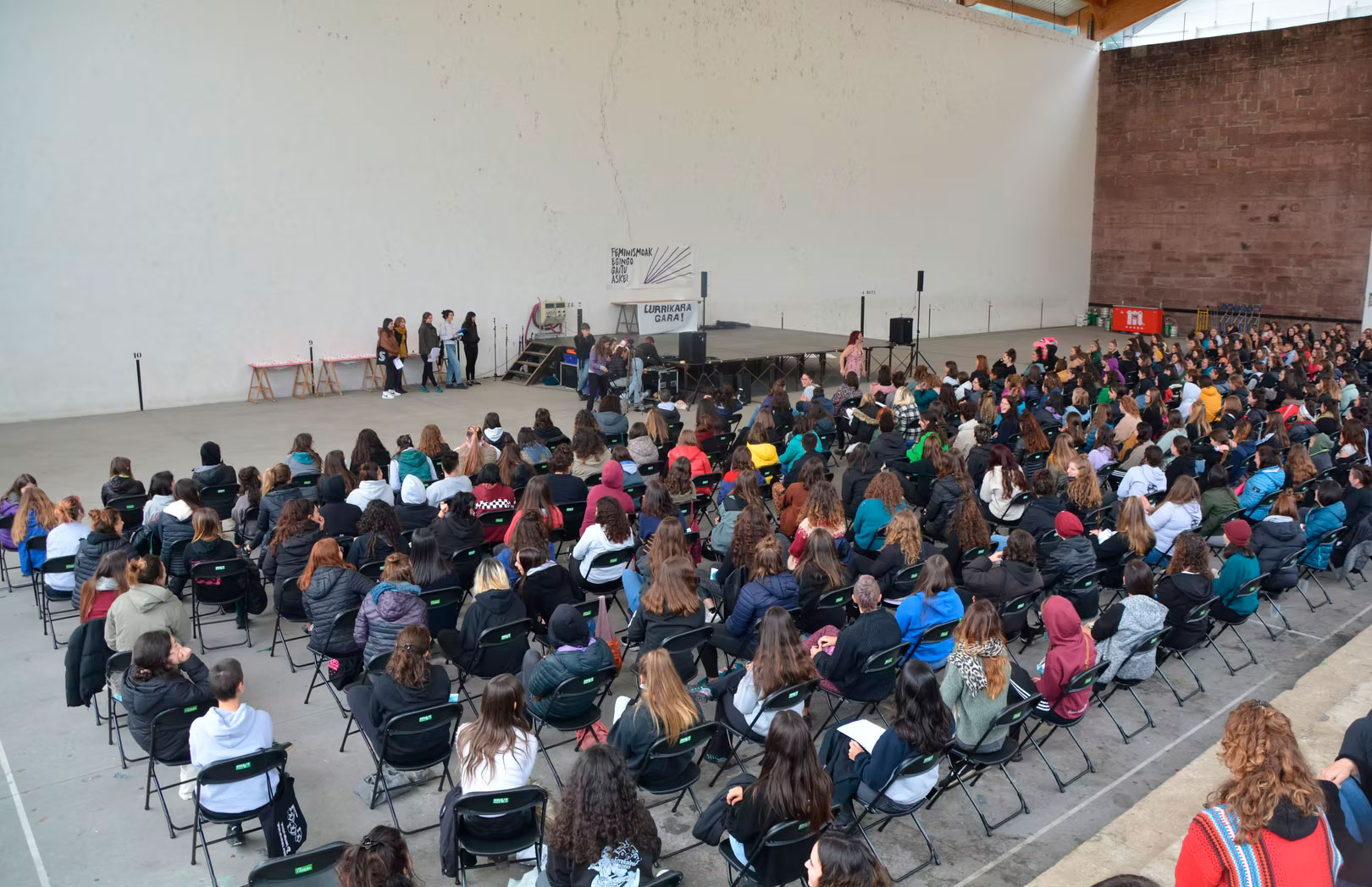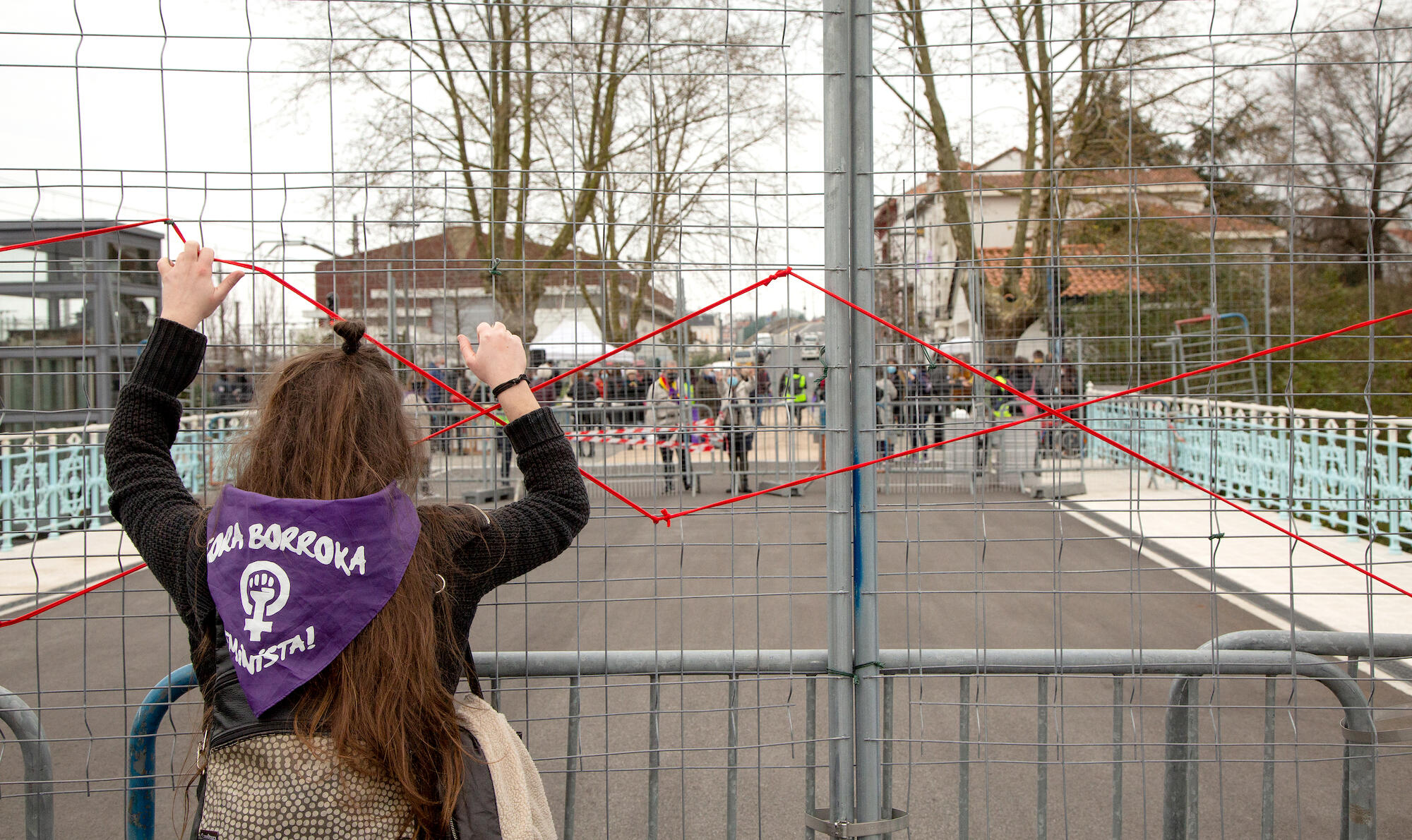Key to women's media involvement
- Journalists Eider Olazar Elduaien and Oihana Etxebarrieta Legrand are working hard to address the gender imbalance in the media. Women on the journalists' agenda: with the Euskal emakume adituak digitala project, they received the Berria Foundation grant in January and the Gabiltza database will be underway by 2015.
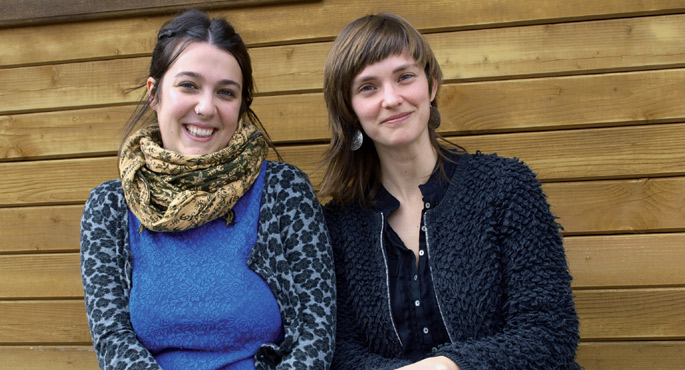
The project was launched with the aim of increasing the presence of women in the media and paving the way for reflection. On the one hand, to create a useful tool for journalists and, on the other, to do awareness-raising work. It’s about putting a spotlight on the voices that have so far had no place in the media,” Olazar explained.
Male model in front line
The presence of men and women in the media is not egalitarian. The former appear as experts and talk about issues that we consider “serious”. Women, on the other hand, tend to appear in the background and deal with “minor” issues that are considered “softer”, such as leisure or culture. “This affects the imaginary of society, because the public receives a distorted image of reality. It seems that women don’t know about economy or law,” Etxebarrieta laments.
“The figure of the reviewers is also, in general, male. In the radio and television tertulias, the rapporteurs participate violently in order to express their opinion. Many women do not feel comfortable in this context and refuse to participate, even if they know a lot about the issue to be discussed,” said Olazar. “Many others aren’t empowered and don’t see themselves as experts,” the radio announcer Info7 added.
Experts and experts
The authors of the project intend to question and transform the figure of the current expert. In his opinion, "the word in the media is that of white men of middle or high class, most with studies. The media and society consider them experts.” In order to reverse this form, the agenda aims to make visible women who have something to say or what to show in any area.
Besides the graduates in academic studies, Olazar and Etxebarrieta have had the opinion of those who have the knowledge of their own experiences. In this regard, they have told us of the need to convey their experiences to the new generations. “Many housewives will not be specialists in macroeconomics, but they know better than anyone the economy of everyday life, reproductive work and care. We have a lot to listen to and learn from them,” says Etxebarrieta.
“Opening the door to new faces and voices opens the door to new issues. The invisible issues in the media and the issues that remain in the private sphere will see the light, and that will offer other ways of understanding and showing reality,” said Olazar.
From the taxable person to the asset
“In the media, women often appear as passive subjects. They are talked about without giving them a voice. That makes it impossible to seek prominence and move away from the front line,” said Etxebarrieta. In Olazar’s opinion, “women are going to become active subjects and are going to make their way into society as they gain prominence in communication.”
In short, this has a great deal to do with the demand. “Women, in addition to self-demands, have a great external demand. Society does not ask women the same as men,” explains Etxebarrieta. “I would set music as an example. In groups, we can find thousands of men who play an instrument on a regular basis, who rise to the stage without complexes. Women, on the other hand, have to play very well to raise the battery, the bass or whatever it is to the table. Same thing with the car. It has become widespread in society that we women drive badly, even though it has been shown that we have fewer accidents. It’s very hard to prove it to others and justify ourselves,” added Hondarribitarra.
Olazar believes this too: “This is a lack of confidence to engage in the public sphere. Fear of the direct, reluctance to the camera and the microphone or lack of security in writing”.
Media concerns
In a sector of Basque journalists there is an interest and a concern to address the issue. Proof of this has been the Treatment of Gender in Journalism organized by the UEU a couple of weeks ago. Workshop of tools and working strategies.
Etxebarrieta was a professor at the Faculty of Humanities and Educational Sciences of Mondragon Unibertsitatea and stressed that “it has been a prosperous course. Those who have approached have been active and have made many interesting proposals for the future. The media have been organised together and ideas have emerged to deal with various issues in the same way. For example, the idea of working on the issue of care in the economy has received widespread recognition.”
“When we addressed this issue at the 2012 Feminist Meetings, we realized that several journalists were in charge of increasing the presence of women in their media. That is a huge burden, and we saw the need to create resources,” says Olazar.
The project is therefore intended to respond to a request from the Basque media. “There is a desire in the local media to change the trend, but tools are needed to help journalists,” the tolosarra added. “The speed of current journalism means that there is little room for reflection and we go to the easiest, falling into the usual speeches.”
In this regard, in addition to presenting the electronic guide, a series of awareness-raising and training sessions will be offered to interested journalists. Participants will teach how to use the tool and give some keys to working with the gender perspective in an appropriate and effective way.
On the other hand, two preliminary models have been used as a reference for the project development: The women journalists’ group in Seville has produced a digital guide of 300 women experts two years ago and the The women’s room project, created in Britain.
From will to commitment
According to the authors, there are things that are changing in recent years, but there is a lot of work ahead. “Even without realizing it, we constantly reproduce the mouths of the patriarchal system. In journalism they are also the daily bread,” says Etxebarrieta. That is why we think it is as important as raising awareness to start taking steps. It is important that journalists avoid sexist stereotypes and gender role sharing.”
“It is true that models are changing and that the presence of women in the media is increasing, even in areas where so far they have been considered the most masculine. But sports news is as always, even if the presenter is a woman,” Olazar criticized.
According to the journalist Tolosarra, in positions of leadership or responsibility of the media in which women hold positions of responsibility, another sensitivity is observed; the subject is disseminated and other values are prioritized. “It doesn’t always mean it is, but it helps there be a more egalitarian approach.”
Finally, Etxebarrieta stressed that working on gender issues cannot be left to a single journalist: “The approach must be integrated into the policy line of the media to ensure the work of a media and to implement it in all areas. In the way of working, in the contents, in the relationships between colleagues and in the treatment of themes”.
Gabiltza izena hartuko du atariak, mugimendua, dinamismoa eta aurrera egitearen ekintza irudikatzeko. “Geldirik ez gaudela, bagabiltzala adierazi nahi dugu. Gainera bil horrekin erabiltzaile eta adituen biltoki izaera islatu nahi da”, azaldu du kazetari hondarribiarrak.
Euskal Herri osoko adituak bilduko ditu egitasmoak: euskaldunak eta erdal hiztunak, feministak eta euren burua feministatzat ez dutenak, baina esparruren batean edo bestean zeresana izan dezaketenak. Oraindik ez dute aditu kopurua zehaztu, baina ahalik eta datu-base aberatsena sortu nahi dute. Horretarako, erabiltzaileek eurek elikatuko duten sistema ipiniko dute martxan. Datu-baseko emakume bakoitzaren fitxa ahalik eta gehien osatzeko haien inguruko bideoak, idatziak, egindako lanak eta proiektuak edota elkarrizketak igotzeko tartea eskainiko du webguneak, baita aditu berriak proposatu eta haien kontaktuak txertatzeko aukera ere.
Web orriaren diseinua eta antolaketa zehaztuta dituzte jada. Bilatzailea eta atalak finkatuta, informatika alorra lantzen dabiltza egun. Besteak beste, aditu eta arituen kontaktuak, albisteentzako txokoa eta dokumentazio esparrua jasoko ditu atariak. Kazetariez gain, herritar ororentzako tresna izatea du helburu, eta horregatik, formaziorako txokoa ere izanen du Gabiltzak. Generoaz kaleratutako txostenak, eztabaidak, hitzaldiak eta mahai-inguruak iragarri eta ipiniko dira bertan. Hala nola, hizkuntzaren erabilera sexista saihesteko gidak. Gestio lana eta alderdi juridikoa ere lotu dituzte, Datuen Babeserako Legeak arautzen dituen zehaztapenek berebiziko garrantzia baitute halako zerrendetan.
Harreman sarea osatzeko eta akordioak bilatzeko baliatuko dute uda. Hainbat esparrutako kolaboratzaile eta “aliatuak” bildu nahi dituzte ahalik eta sare handiena sortzeko. Jada akordio sendoa lortu dute UEUrekin; ondorioz Inguma, Euskal komunitate zientifikoaren datu-basea, elkartrukerako lagun izanen dute. EHUko Berdintasun Zuzendaritzarekin ere harremanetan daude, eta askotariko herritarrekin hasiak dira elkarlanean. Irailean hasiko dira webgunea adituen fitxekin osatzen eta urte amaierarako bukatu nahi dute proiektua.
I have had days of visits, experiences and reflections. There I am, trying to make intersectionality a reality, trying to connect struggles, trying to say all the points as bertsolaris, without pounding...
From the community radio station LoRa where I work, we organized a round... [+]
Sare sozialetako argitalpen baten bidez, otsailaren 23an, Ane Santesteban txirrindulariak (Errenteria, Gipuzkoa, 1990) endometriosia daukala iragarri zuen. Diagnostikoak lagundu egin dio ulertzen zergatik batzuetan gaizki sentitzen den bizikletan: “Kisteak aldaka okertzea... [+]
Errepikatu nirekin: Sara Millerey. Ez dezagun ahaztu bere izena. Transfeminizidioaren biktima da Millerey: gorrototzaile transmisogino batek torturatu zuen, besoak moztu zizkion eta bizirik bota zuen ibaiertz batera. Bi orduko agoniaren ondoren hil zen.
Errazagoa da J.K... [+]
Many Basque feminists have been disappointed to learn that writer Chimamanda Ngozi Adichie has externalized pregnancy, meaning that a surrogate has fertilized her baby for money.Adichie is the author of the essay We should all be feminists, among others. They have ignored the... [+]









